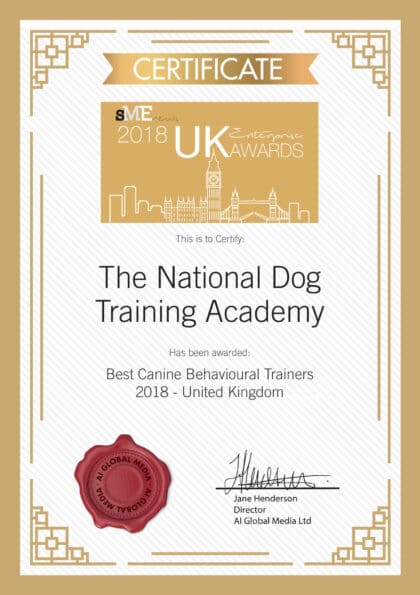Becoming a dog trainer isn’t just about learning theory — it’s about gaining the skills, confidence, and resources to step into a professional career.
At NDTA, we do things differently:
✅ Career changers ready to build a sustainable business
✅ People who want more than just theory — real dogs, real owners, real teaching
✅ Anyone who values community, mentoring, and long-term support
❌ Hobbyists looking for casual tips
❌ Anyone wanting a “quick and cheap” certificate
❌ People unwilling to commit time and effort to practice
We believe in honesty from the start. Once you book your place, we cannot offer refunds.
Here’s why:
When you commit, we commit — fully, for life.
| Most Dog Trainer Courses | NDTA Dog Trainer Certificate |
|---|---|
| Online theory only | Online materials plus unlimited in-person training |
| Limited tutor support | Lifetime mentoring with no expiry |
| Short workshops (if any) | Ongoing hands-on experience with real clients |
| Content access expires | Instant + lifetime access |
| Focus only on training theory | Theory + teaching skills + NDTA Award frameworks |
| No business-ready resources | 6-week lesson plan block to start running classes immediately |
💳 One-off payment: £1,997
Costs vary widely. Many online-only courses start from a few hundred pounds, while recognised in-person programmes can range from £2,000–£5,000. The NDTA Dog Trainer Certificate is £2,000, which includes lifetime mentoring, unlimited in-person experience, and ready-to-use training resources.
No — at present, dog training is an unregulated industry in the UK. However, clients increasingly expect professional qualifications and hands-on experience. Completing a structured programme with in-person training and assessment can give you a competitive edge.
It depends on the route you choose. Some online courses can be completed in a few weeks, but to gain real-world confidence, you should expect several months of guided study and practical work. At The NDTA, students typically complete the certificate over 3- 6 months, with lifetime access to ongoing mentoring and academy visits.
Yes. Many trainers start with nothing more than a love of dogs and a desire to learn. The key is finding a course that provides both theory and hands-on practice. Our students often begin as complete beginners and go on to run their own classes and businesses.
There’s no single required qualification in the UK, but recognised certificates from professional bodies or academies show clients you’ve been trained to a high standard. Look for programmes that combine online study, in-person training, and mentoring.
Yes — if you enjoy working with dogs and people, it can be rewarding and flexible. Many dog trainers run their own businesses, offering classes, 1:1 sessions, and workshops. The demand for professional, ethical trainers continues to grow.
Yes. Many of the students at The NDTA become a dog trainer while not owning a dog. Most, in all honesty, do then get a dog in the early stages of their new career. This is a great way to understand the challenges of new dog or puppy ownership and give you the empathy clients need.
You’ll need a solid foundation in training methods, teaching skills, and business know-how. The best way to begin is with a course that not only covers dog behaviour but also provides lesson plans, client frameworks, and mentoring — so you’re supported beyond the classroom. At The NDTA you will get support in how to set up a business and the community support gives you opportunity to get guidance from earlier students already running their own business.







© NDTA 2025
| VAT number: 287 0655 73
Website by Eldo™